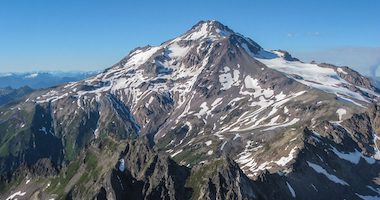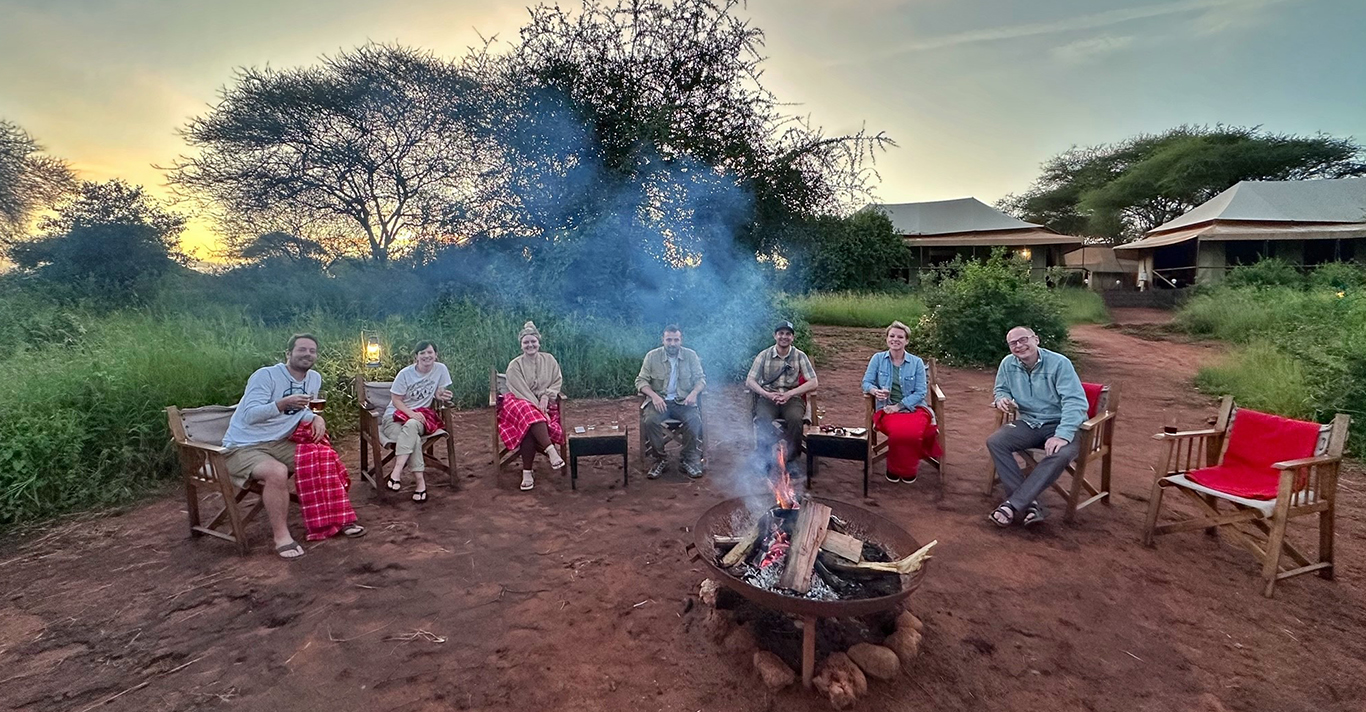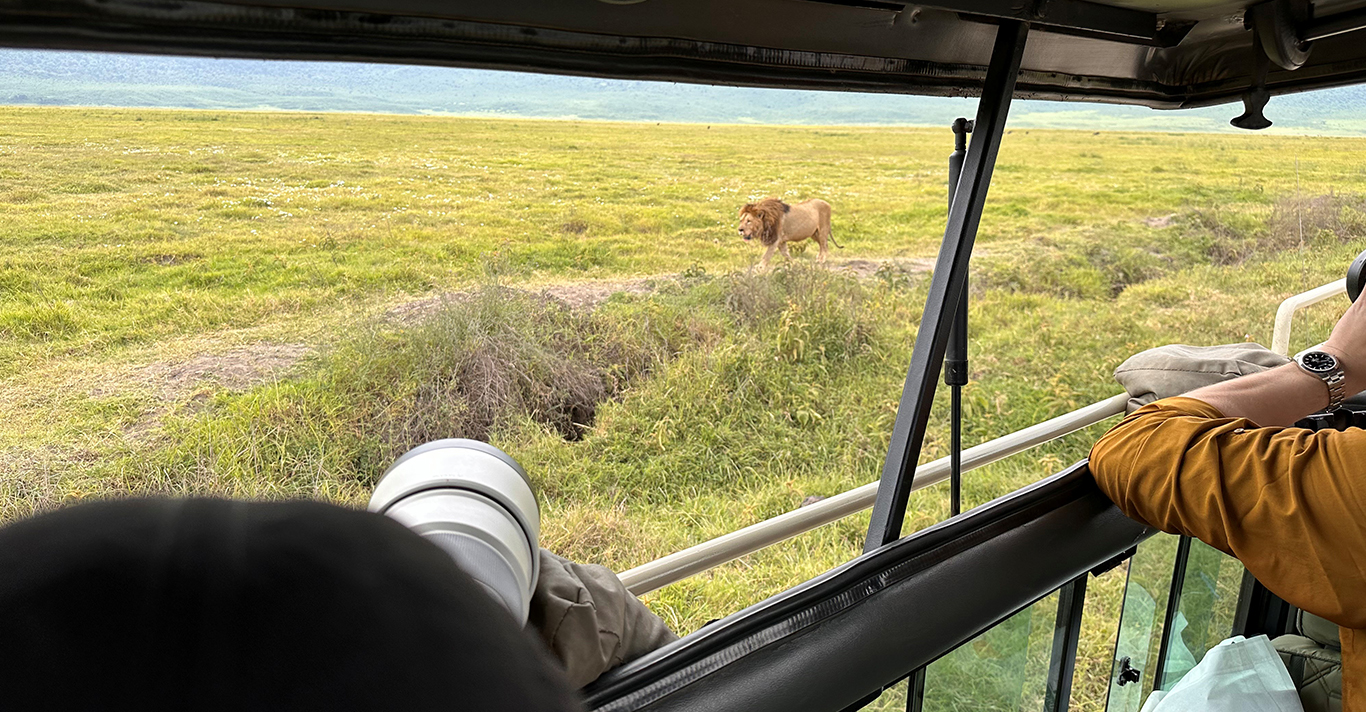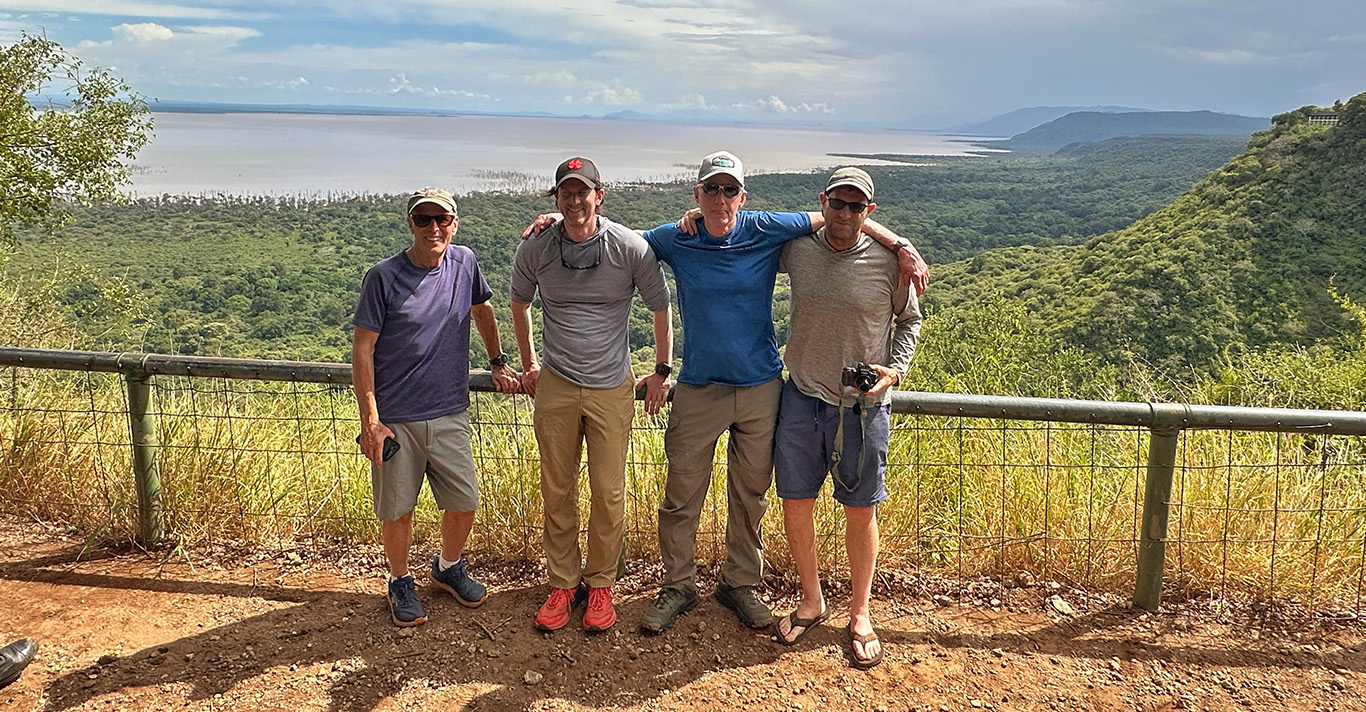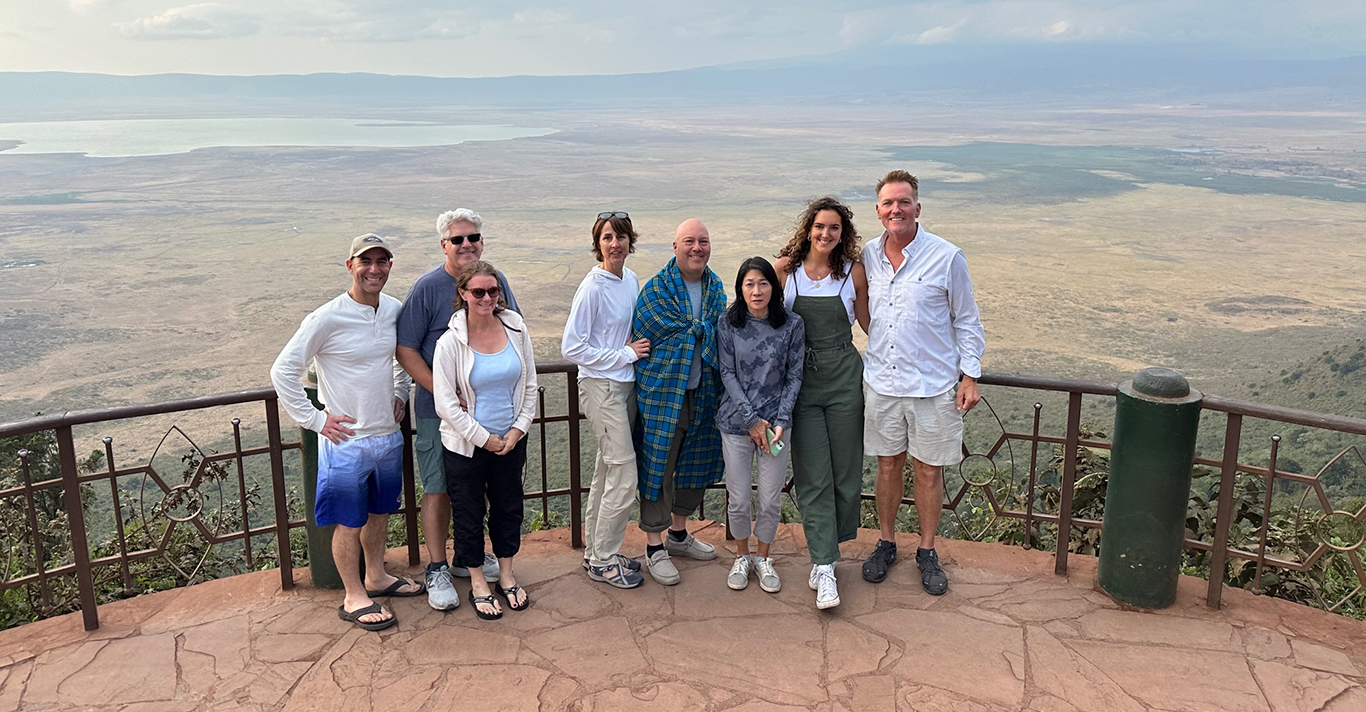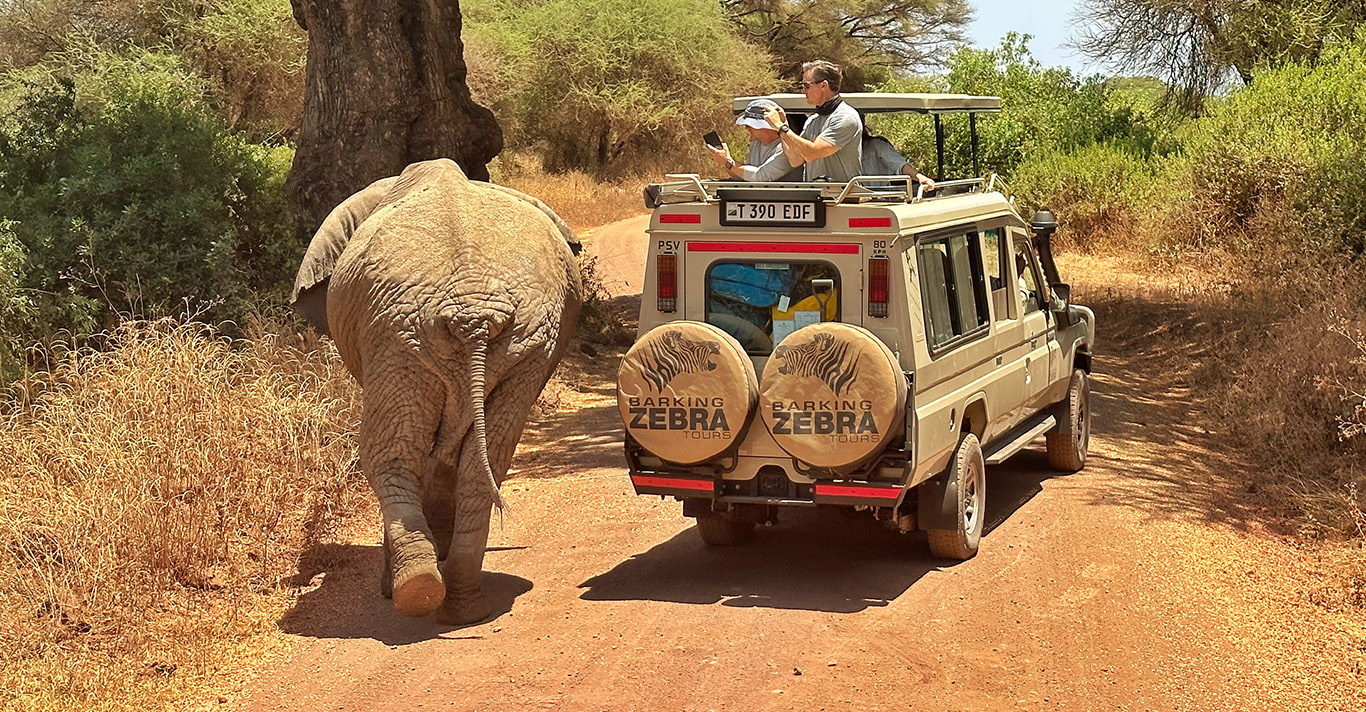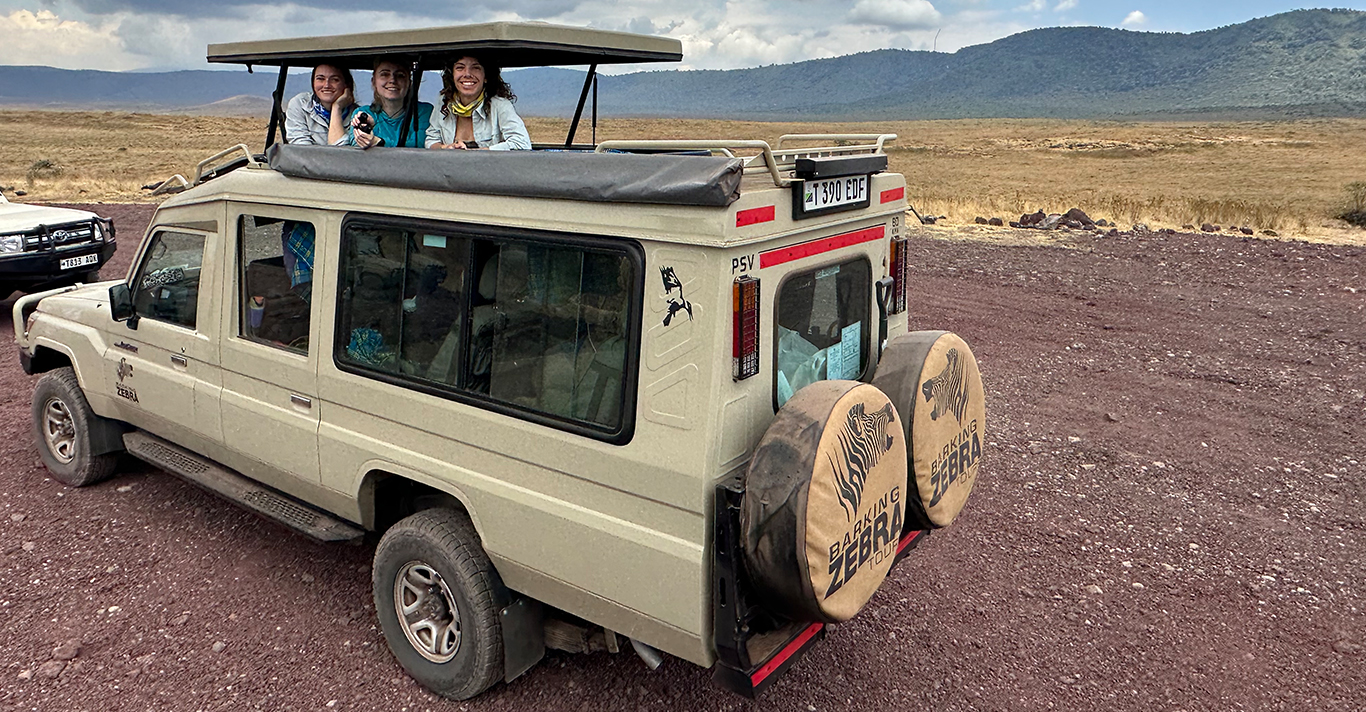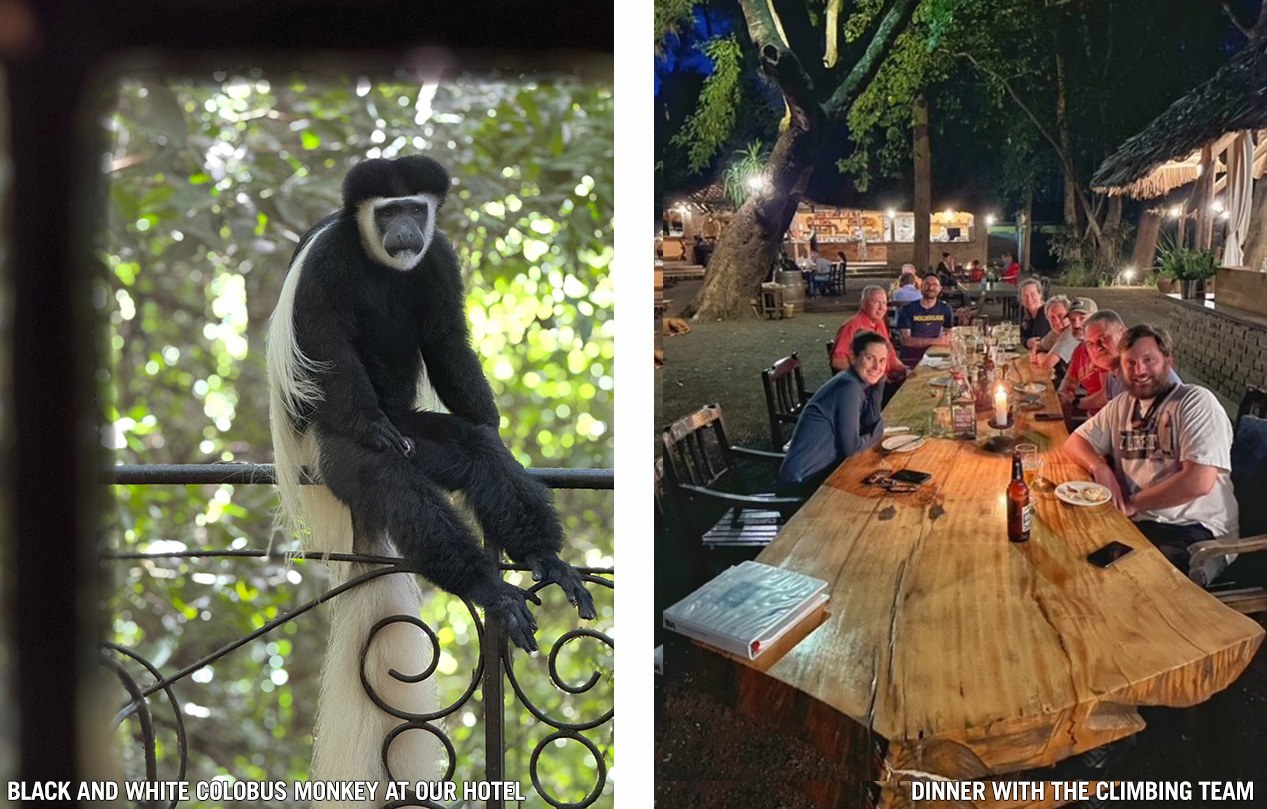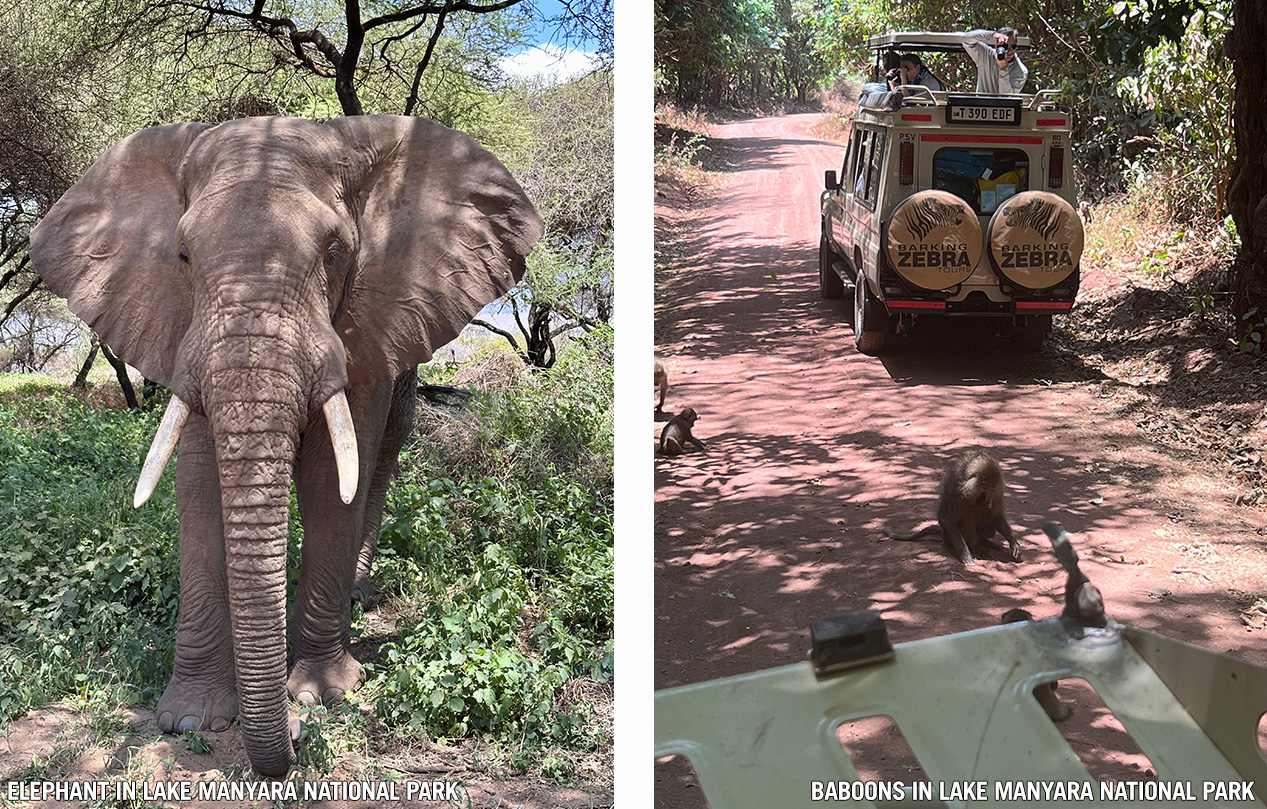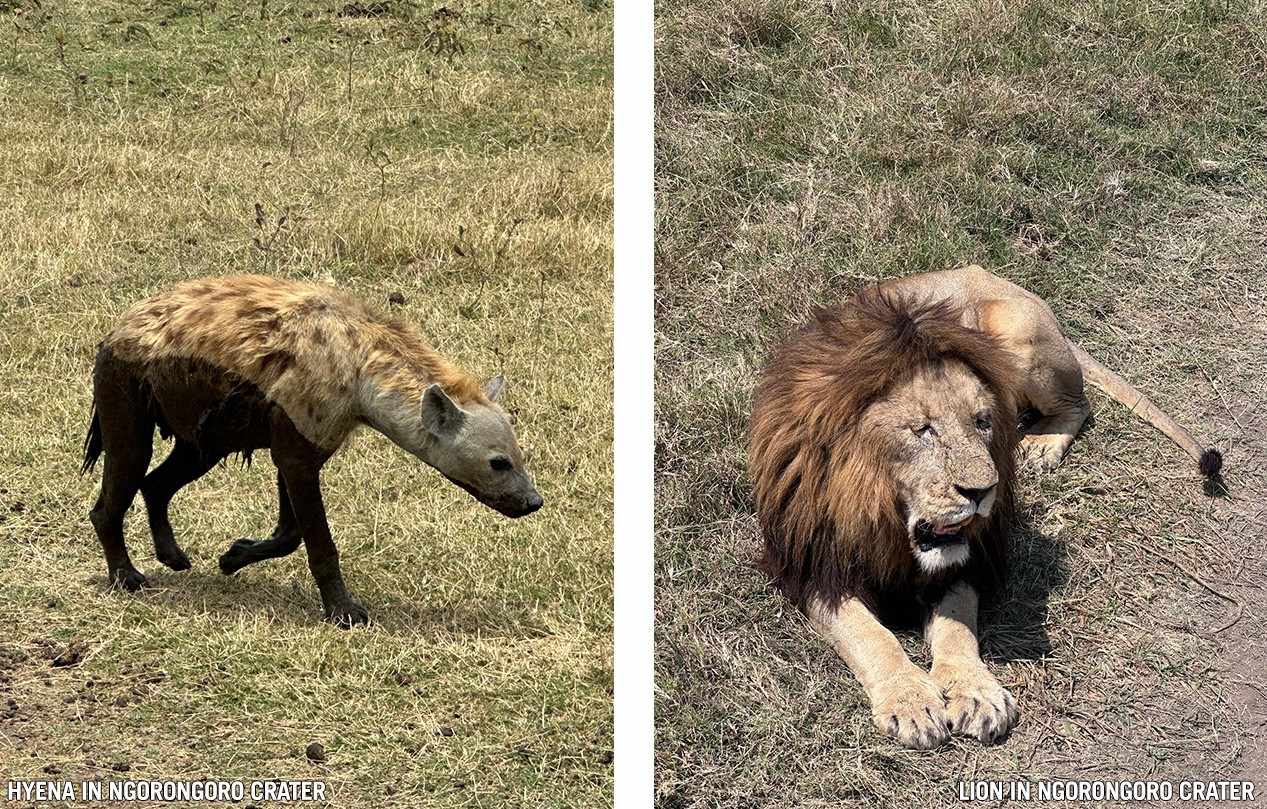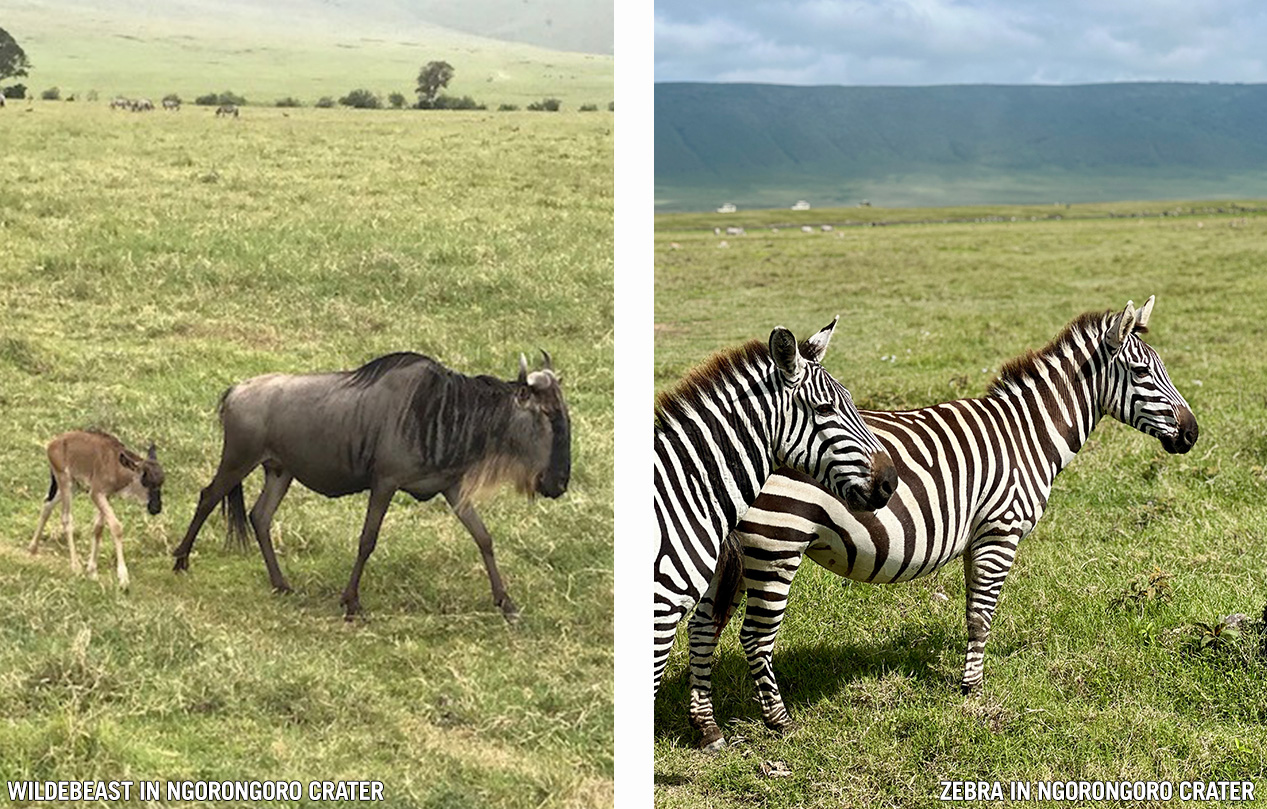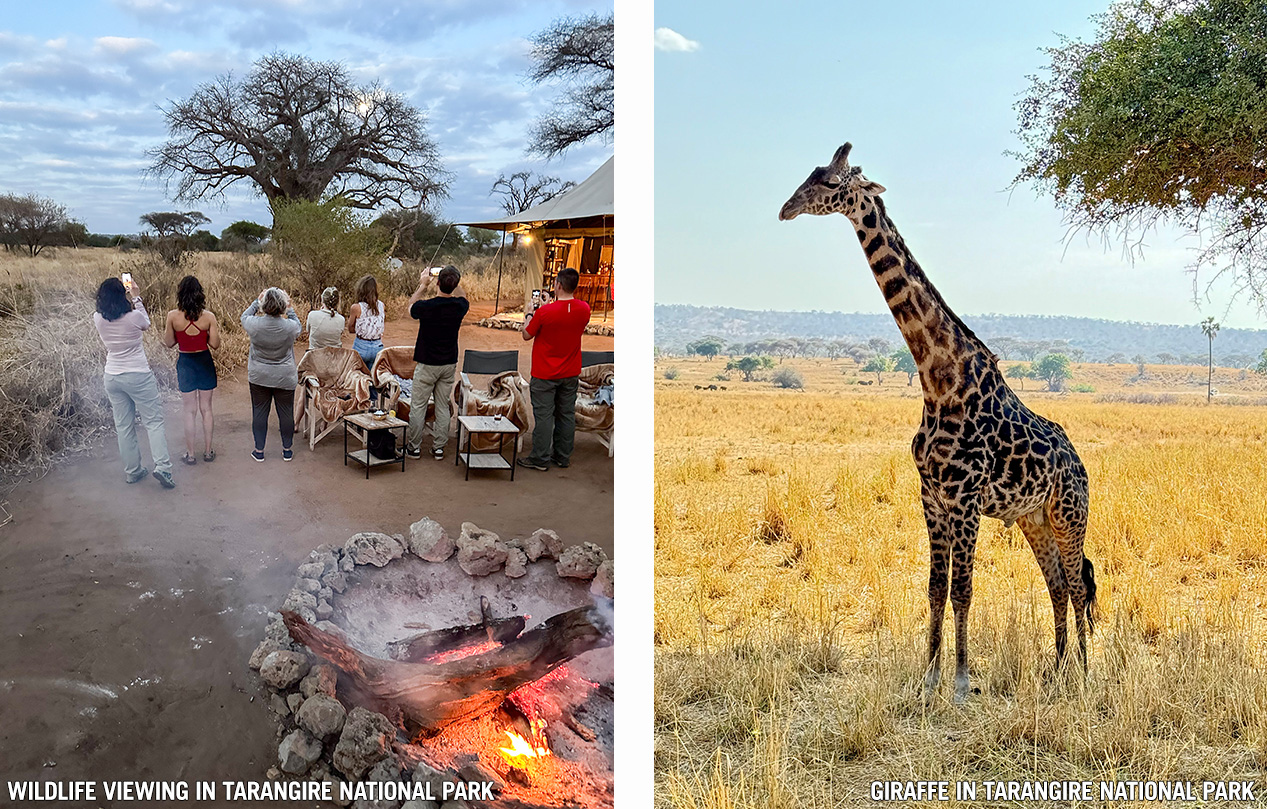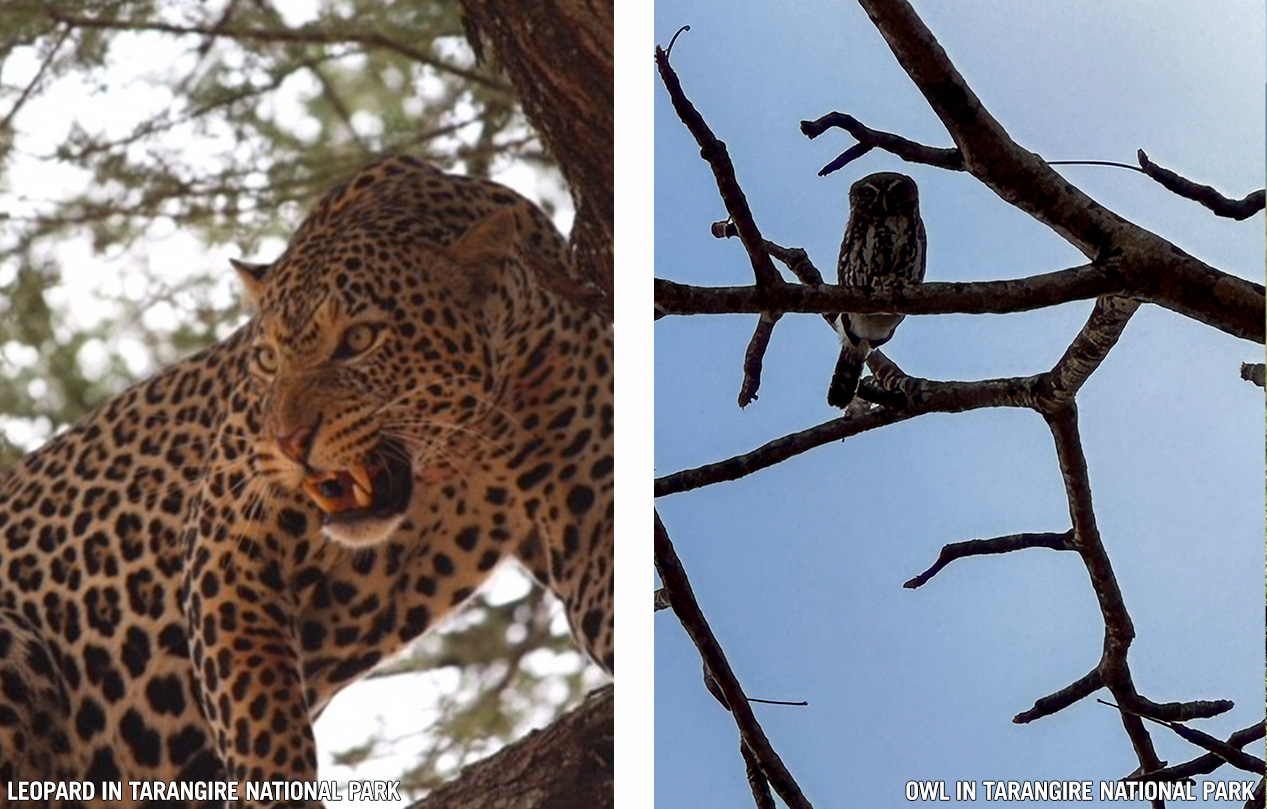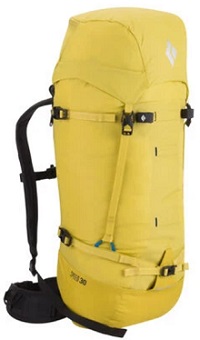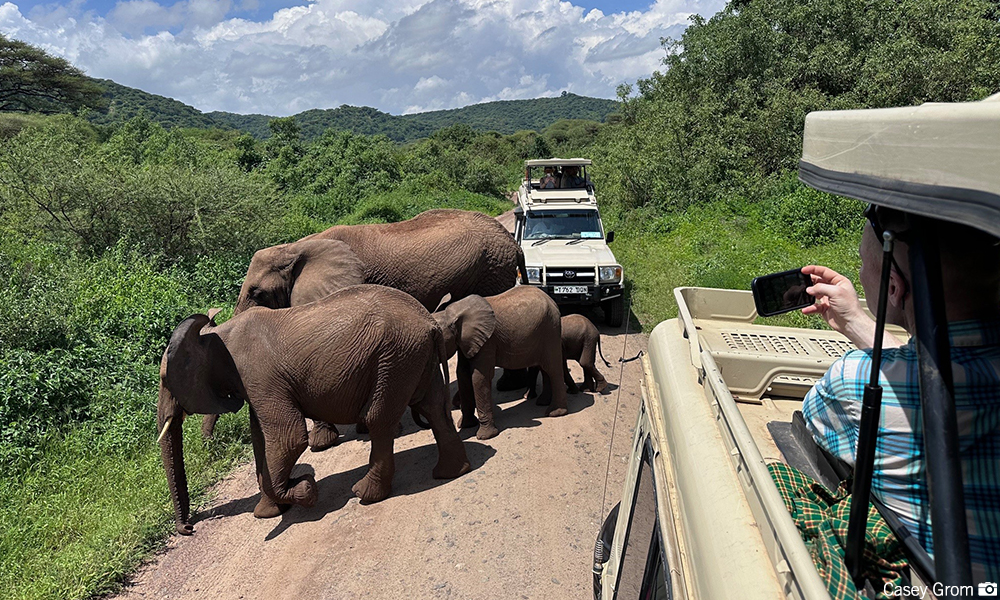
Watch bull elephants walk across the floor of the Ngorongoro Crater and leopards lounge in the Acacia trees of the Tarangire, embarking on a safari to Tanzania’s famous National Parks where we witness one of the greatest wildlife spectacles found anywhere on earth.
Over the course of four days we watch herds of Africa’s greatest animals amidst the scenery of the Ngorongoro Crater, Lake Manyara, and Tarangire National Parks. Each evening we return to the comfortable luxuries of our secluded safari lodges, located right along the edges of the parks we visit. Watching the sun set across the African landscape from the porch of our safari lodge is the perfect way to finish our adventure.
RMI's KILIMANJARO GUIDES
RMI Expeditions' Kilimanjaro guides have extensive experience on Kilimanjaro and around the world. Together they have reached the summit of Kilimanjaro over 53 times and over 1,147 summits of Mt. Rainier. They have records for the most summits on Mt. Rainier, Vinson Massif, and Mt. Everest (by a non-sherpa). Read more about our Kilimanjaro guides and discover how our guides set this Kilimanjaro Climb and Safari apart from our competitors.

-
Casey became captivated by climbing in 1993, which led to his escape from the corn and cows of Ohio. He worked for numerous years on a square-rigged wooden sailboat where he learned "the ropes". He spent the next few years honing his skill climbing rock and ice throughout much of the U.S. and in 2000 he started his guiding career at Rainier Mountaineering Inc. (RMI). He has since then guided all over the world. Casey takes pride in being a well-rounded climber, which has led him from the ice routes in Canada to the rock climbs of Yosemite. Read more...

-
Brent began guiding on Mt. Rainier in 1986. As a Senior Guide and Supervisor he has over 590 successful ascents of Rainier. In 1991 he reached the summit of Mt. Everest via the North Ridge (Mallory’s 1924 route). Ten years later he revisited Mt. Everest as part of the 2001 Mallory-Irvine Search Expedition. Brent has summited Mt. McKinley a remarkable 23 straight times in 24 expeditions. He has also guided extensively throughout the Alps of Switzerland, France and Italy, as well as Mexico, Antarctica and Alaska. Read more...

-
Dave Hahn has reached the summit of Mount Everest fifteen times out of 21 tries. He has guided climbers to the summit of Mount Rainier more than 300 times, and has led 37 attempts on Mt. McKinley, reaching the summit 25 times. Dave has reached the summit of the Vinson Massif in Antarctica 38 times. In 2006, Dave guided a team of professional athletes on an expedition to ski Mount Everest. In 1999 Dave participated in the expedition that discovered and identified the remains of explorer George Mallory, who died trying to scale Everest in 1924. Read more...
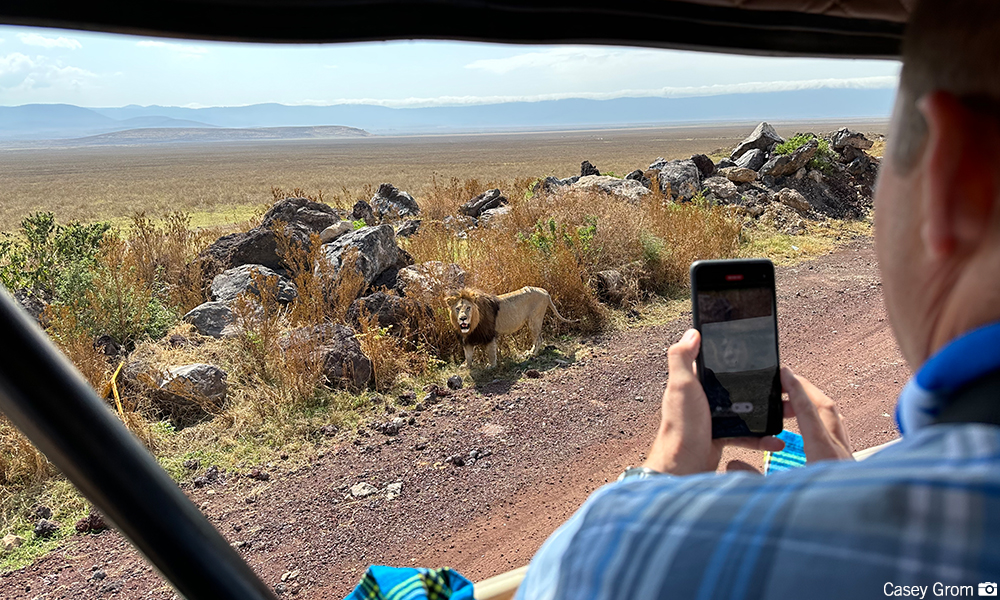
THE RMI DIFFERENCE
Rainier Mountaineering, Inc. was established in 1969 and is one of America's oldest and most-trusted guide services. We are the largest guide service on Mt. Rainier and Mt. McKinley and leaders in guiding climbs and treks around the globe. Our years of leading mountain adventures give us the experience and knowledge to lead the best possible trips. We work hard to live up to our reputation as an industry leader. Our trip preparation before departure takes care of the details for you, from lodging and airport transfers to safari schedules, so that you can focus on preparing for the safari instead of the distraction that comes with coordinating logistics.
During our time in Arusha and while on safari we stay at select lodges that are intimate, comfortable, and wonderfully run; they have been hand picked by our guides over the course of the years as their favorites.
As you prepare for your upcoming adventure please feel free to contact our office and speak directly to one of our experienced guides regarding equipment, conditioning, the route, or any other questions you may have about our programs. We are available Monday thru Friday 8:30 a.m. to 4:00 p.m. at (888) 89-CLIMB or [email protected].
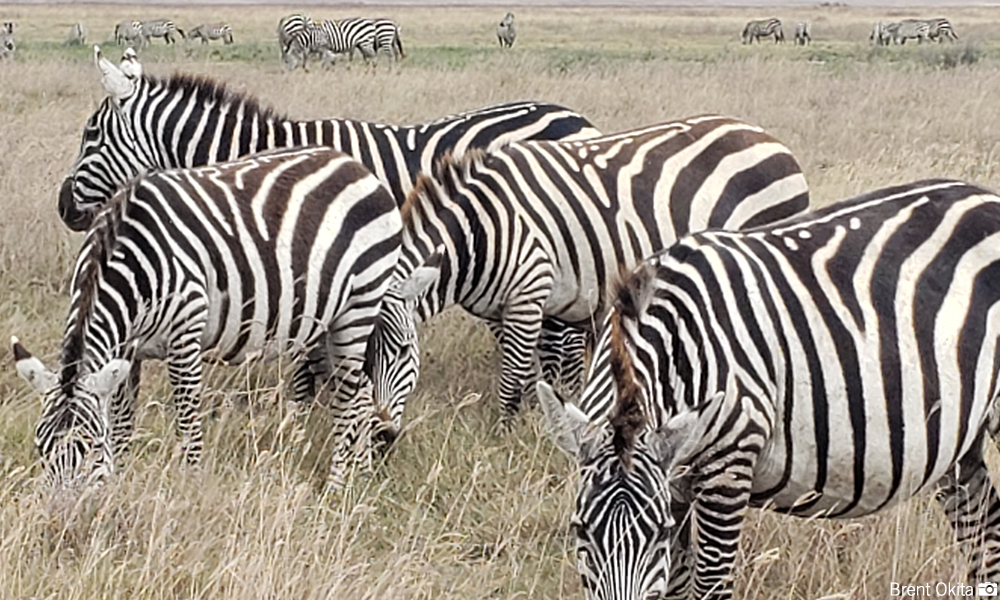
Travel Consultant
RMI has partnered with Erin Rountree to provide comprehensive travel support. We have been working with Erin for many years. As an independent agent of the Travel Society, she has booked countless miles for adventure travelers across the globe and is extremely knowledgeable about the travel needs of our programs. Please call (208) 788-2870 or send email to [email protected].
Travel Insurance
Travel insurance is required for this trip.
Your travel insurance policy should include trip cancellation, trip interruption, travel delay, baggage loss or delay, medical expenses, and evacuation.
Navigating through the different options for travel insurance can be challenging. When purchasing Travel Insurance, here are a few items to consider:
- Read the fine print. Travel Insurance offers reimbursement when you must cancel your trip for an eligible reason for prepaid, non-refundable trip costs that you insure. However, there are exclusions, so make sure you understand the "eligible reasons."
- Confirm that your activity is an eligible "activity." Not all travel insurance policies will offer coverage for activities such as mountaineering, climbing, skiing, or trekking adventures. Policies can also exclude coverage for activities due to the gear used (crampons, ice axe), activities that go above specific elevations, or activities in a particular region of the world. If there are exclusions, you may need to add an "Adventure" or "Sports" package to help cover your activity.
- Verify that your state of residence is allowed with the policy that you are purchasing. Not all insurance companies offer policies in all 50 states.
- Contact your travel protection company directly for any questions you have regarding benefits or coverage.
TRAVELEX
In today’s changing travel environment, it’s important to protect your travel investment. Unforeseen events such as flight delays, baggage loss or even a sudden sickness or injury could impact your travel plans. For your convenience, we offer Travelex Insurance protection plans to help protect you and your travel investment against the unexpected.
For more information on the available plans visit Travelex Insurance Services or contact Travelex Insurance (800) 228-9792 and reference location number 47-0370.
The product descriptions provided here are only brief summaries and may be changed without notice. The full coverage terms and details, including limitations and exclusions, are contained in the insurance policy. Travelex Insurance Services, Inc. CA Agency License #0D10209. Insurance coverages underwritten by individual member companies of Zurich in North America, including Zurich American Insurance Company (NAIC #16535, state of domicile: New York). RETWEB
RIPCORD
Ripcord Rescue Travel Insurance is travel insurance designed for adventurers, including the best evacuation and rescue services available.
Benefits are tailored for adventurers and include:
- Rescue and evacuation from the point of illness or emergency to your home hospital of choice.
- Trip cancellation/interruption, primary medical expense coverage, sporting goods, baggage loss, emergency dental, Accidental Death & Dismemberment (AD&D) and more.
- Completely integrated one-stop program with a single contact for emergency services to travel assistance and insurance claims.
- 24/7 access to paramedics, nurses and military veterans.
- Security extraction in case of unexpected dangerous and chaotic events.
- Cancel For Any Reason (CFAR) options and pre-existing condition waiver within 14 days of your initial trip deposit.
Ripcord Rescue Travel Insurance is powered by Redpoint Resolutions, a medical and travel security risk company. Their team is comprised of special operations veterans, paramedics, Stanford Medicine affiliated physicians, former intelligence officers, insurance actuaries and global security experts with dozens of years of experience in theaters around the world. The Redpoint network covers the globe, making them uniquely equipped to provide elite rescue travel insurance – in every sense of the word. Whether it’s reimbursing you for a cancelled trip, paying your travel medical bills or evacuating you home in an emergency, Ripcord takes the worry out of your travel.
Travel Advisories / Warnings
Please confirm any current travel advisories/warnings as well as entry requirements with the U.S. Department of State.
Getting There
Travel to Tanzania is relatively straightforward. Most people fly to Kilimanjaro International Airport (JRO) in Arusha either directly from Amsterdam or from London with a connecting flight through Nairobi.
The time in Tanzania is ten hours later than in Seattle; seven hours later than New York.
Flights departing Arusha should be booked for 7 p.m. or later on our last day in Africa (Day 7).
Entry Requirements
A valid passport is required when traveling to Tanzania. Your passport must be valid for 6 months beyond the expected date of return. Visa are required for U.S. passport holders traveling to Tanzania.
We suggest making a copy of the first two pages of your passport and keeping them in a separate bag as a backup. A copy should also be left with your emergency contact.
Tanzanian Visa
A Tanzanian visa is required for travel. We recommend that you apply for this visa 3 - 6 months before your trip.You may register for a Tanzanian Visa by completing the online application from the Embassy of Tanzania. Please visit the Tanzania Embassy website for more information.
Airport Arrival
Once you have entered the Arrivals Building, proceed to the Immigration Counter. Claim your checked bags at the Baggage Claim and then proceed through Customs. Be sure to keep all your bags together. After you clear Customs, your RMI guide will meet you outside.
In-Country Transportation
The provided transportation in Tanzania as stated in the itinerary is via private vehicle.
Immunizations & Travel Medicine
For the most current information on inoculation requirements and recommendations, please refer to the Centers for Diseases Control and Prevention.
Traveler's Health
Travelers may suffer from upset stomachs when in foreign countries. There are some basic rules, however, that can help keep you healthy.
- Hygiene: It is important that you wash your hands thoroughly before meals and after using the restroom. If water is not available for washing, we recommend using a hand sanitizer.
- Water: The number one rule is: don't drink the water, and that includes shower water and ice! Brush your teeth with purified water rather than tap water. You should check bottled water for a good seal and use a napkin to wipe excess moisture from drinking glasses. Take care with fruit juice, particularly if it has been diluted with water. Carefully clean the tops of bottled beverages before opening.
- Food: If it is cooked, boiled or can be peeled, you can usually eat it. Salads and fruits should be washed with purified water or peeled where possible. Be wary of ice cream and shellfish. Always avoid any undercooked meat.
Medical Emergencies
While the small Mt. Meru Regional Hospital is located in Arusha, no Level 1 trauma care exists in Arusha or Moshi. Kilimanjaro and the safari remain remote locations without established medical facilities. Medical emergencies would require transport to a higher level of care in Nairobi, Kenya.
Tanzania Country Facts
The United Republic of Tanzania lies in East Africa at the edge of the Indian Ocean. The spice island of Zanzibar is separated from the mainland by a 22-mile channel. The country's name derives from the names of the two initial states, Tanganyika and Zanzibar, which unified in April 1964 to become Tanzania.
The population of Tanzania is nearly 45 million persons, consisting of numerous tribal and ethnic groups. 44% of the population is age 15 or younger.
The official language of Tanzania is Swahili, but English is widely spoken or understood and is the principal language of commerce.
Tanzania has a spectacular landscape including islands, coastal plains, the inland plateau and the highlands. The Great Rift Valley that runs from north east of Africa through central Tanzania adds scenic beauty to the country. The country has the largest concentration of wild animals and is home to numerous famous national parks and game reserves.
TANZANIA PLASTIC BAG BAN
As of June 1, 2019, all plastic bags, regardless of their thickness are prohibited to bring to Tanzania. Visitors to Tanzania are advised to avoid carrying plastic shopping bags, storage bags, or garbage bags in their suitcase and hand luggage to Tanzania.
Plastic bags known as "ziploc bags" that are specifically used to carry toiletries are permitted as they are expected to remain in the permanent possession of visitors and are not expected to be disposed in the country.
Weather
Tanzania enjoys a warm equatorial climate. Though Kilimanjaro is relatively dry and can be climbed year round, the main climbing seasons are during the months of January-February and June-September. These dates take advantage of both the best weather on Kilimanjaro as well as prime game-viewing. The weather is usually sunny and warm at the lower elevations, but can be quite cool in the evenings. It is not uncommon to experience cooler temperatures while on safari.
The two rainy seasons on Kilimanjaro are during the months of April-June and October-December. During the rainy season temperatures are colder and the trails turn muddy. The game viewing areas are also affected during this period as muddy roads may force closures of certain areas.
Cultural Etiquette
Although it is not expected that we dress formally, we should dress modestly. Casual and comfortable clothing and shoes are suggested. Showing expensive cameras, watches, jewelry, etc. is considered unseemly and may attract unwanted attention.
On occasion, you will be approached by children for some little gift. Some ask directly for money. These children can be quite persistent. To keep from being hassled, a polite but firm “No, thank you” is generally sufficient.
It is expected that you engage in some degree of bargaining for market or street purchases. This is fun, and should be taken lightly.
Ask for permission before photographing individuals, particularly indigenous people. Most of the locals will gladly pose for a photo in exchange for a small gift. If in doubt, either ask or refrain. Don't photograph any government or military property or persons; this includes the airport.
Electricity
Since the electricity in Africa is not the same as in the United States, voltage converters and plug adapters are required in order to use U.S. appliances.
Money
The official currency of Tanzania is the Tanzanian shilling (TSh). Check a financial newspaper or www.xe.com for the current exchange rate prior to departure.
U.S. Dollars are accepted nearly everywhere. It is best to use crisp, clean bills printed in 2006 or later. We suggest bringing $500 total for personal spending money including restaurant meals, drinks, pocket money, and the Support Staff Tip Pool.
We recommend that you have some small denominations of cash with you for your arrival at the airport, shopping at local markets, paying for drinks, visiting a Maasai Village, etc. You should change to TSh only as much money as you think you may spend (i.e., carry cash of small denominations) as local currencies cannot be removed from the country or reconverted.
Cash machines, by far the best way to get cash in country, are readily available in Arusha and on safari.
Everyone has a preferred way to carry money. Some use money belts, others have hidden pockets. Whatever you do, be aware of pickpockets in any area which caters to tourists.
Tipping
Here are some tipping guidelines for your trip.
Support Staff Tip Pool: We recommend that each climber contribute $100 to the Tip Pool. This is collected at the beginning of the trip and will cover group tips for all our support and mountain staff throughout the program. Tips are expected and considered part of their wage. We follow the tipping requirements as outlined by the Kilimanjaro Porters Assistance Program (KPAP).
Our guides work hard to ensure your well-being and success on the mountain. If you have a positive experience, gratuities are an excellent way to show your appreciation. Amounts are at your discretion and should be based on your level of enjoyment. Tips for excellent service normally average 10 – 15% of the cost of the program. If you would rather not bring the guide gratuity with you on the trip, you can send a check or call the RMI office to pay with a credit card upon your return.
Resources
There are a number of books on travel health including: Staying Healthy in Asia, Africa and Latin America by Dirk Schroeder. Lonely Planet, Let's Go, Fodor's and Frommers are all good travel guides. Information and updates can be found on the website for the U.S. Department of State Bureau of Consular Affairs, which provides medical information for travelers as well as the consular information.
Alexander Stewart, Kilimanjaro: A Complete Trekker's Guide (A Cicerone Guide). Cicerone Press, 2004.
This is a beautifully illustrated, useful and packable guide.
GameReserve.com offers detailed and comprehensive information on Africa's top game parks.
What You’ll Need
A list of required personal equipment accompanies every RMI program, and the thought process behind each item is much greater than simply “preparing for the worst and hoping for the best.” The list for your program takes into account factors such as: seasonality, route conditions, weather, elevation and more. As such, this list is framed within the broadest of contexts and is dynamic by its very nature. Therefore, certain variables (additions and/or subtractions) are inherent within such an all-encompassing list. We make every effort to recommend only top of the line clothing and technical gear and it is never our intention for you to buy or rent unnecessary gear.
The Guide Pick is an example of the listed item, giving you an idea of the material and specifications of the item. This exact item does not need to be purchased or used; however, any item you choose must have similar characteristics and performance abilities to the Guide Pick.
RMI Guides concur on the potential necessity of every item, thus every item on the list is required at gear check. However, guides may also have suggestions derived from their experience, some of which will vary from a given list. The guides’ recommendation whether to bring along or leave behind certain item(s) comes during the gear check, when the team first meets. Occasionally this recommendation comes at the expense of having previously purchased an item. If a guide presents the option of leaving behind certain item(s) on the list of required equipment, it is for a reason. Their recommendation may be related to the weather, route conditions, freezing level, perceived strength of the party, or desired pack weight.
Ultimately, there will never be a consensus for a “perfect” equipment list for an ascent. It does not exist because of the multitude of variables faced by climbers throughout the climb. Please follow this equipment list closely so that you will arrive for the gear check with all the required items. Keep in mind the list is not black and white, fine tuning will occur once you meet with your guide. Have a great climb!
-
 Most of the required equipment is available for rent or purchase from our affiliate Whittaker Mountaineering. RMI climbers receive a 10% discount on new clothing and equipment items ordered from Whittaker Mountaineering.
Most of the required equipment is available for rent or purchase from our affiliate Whittaker Mountaineering. RMI climbers receive a 10% discount on new clothing and equipment items ordered from Whittaker Mountaineering.
Shop Your Equipment List // Rent new equipment for your climb
Equipment List
Pack & Travel
A 25+ liter day pack to use as carry-on or while sightseeing. This will not be used on the trek. If you have some other preferred way to carry a few miscellaneous items, then there is no need to bring this day pack.
Head
Regular sunglasses will suffice on this program; glacier glasses are not required.
Feet
Great for traveling and wearing around town or camp. A pair of tennis shoes or light hikers works well.
First Aid & Medications
We recommend you speak with your physician about which medications you should have while traveling. Please talk with your guide before taking medications.
At a minimum, we require the following medications:
Broad spectrum antibiotics for respiratory and gastrointestinal problems like Azithromycin (250mg tablets).
Travel Clothes
We recommend bringing a selection of clothing to wear while traveling, sightseeing and dining.
Travel Documents
Valid for six months beyond your return date.
The first two pages of your passport.
Pre-Trip Checklist
Purchase travel insurance.
Purchase airplane tickets.
Payments
Deposit Payments: A non-refundable deposit payment of $1,500 per person secures your reservation.
- Deposit payments may be made via MasterCard, Visa, American Express*, e-check/ACH, or check from a U.S. bank.
Balance Payments: The balance payment is due 120 days before the start of your program.
- Balance payments may be made via MasterCard, Visa, American Express*, e-check/ACH, check from a U.S. bank or wire transfer.**
- **Wire transfers must cover all fees charged by your bank. The amount of the incoming wire to our bank must equal the balance payment amount.
- A payment reminder is emailed approximately three weeks before your payment due date. If your balance payment is not received 120 days before the start of your program, your reservation will be canceled, and all program fees will be forfeited.
- Payment in full is required when registering for a program within 120 days of the departure date.
*There is a 3% surcharge on all credit/debit card transactions.
**Wire transfers must include all fees charged by your bank. The amount received by our bank must match the deposit amount.
Cancellation
$1,000 of the $1,500 per person deposit is non-refundable and non-transferable.
Written notification is required for all cancellations. Once RMI receives written notification of cancellation, the following apply:
- If you cancel 90 or more days before the start of your program, the program fees will be refunded less $1,000 per person.
- If you cancel less than 90 days before the start of your program, no refunds will be issued.
Due to the time-sensitive nature of these programs, and the amount of preparation time required for this program, we strictly adhere to our policy and cannot make exceptions for any reason.
Cancellation Insurance
We require that everyone purchase travel insurance. Please see our Travel Page for details.
Land Cost
INCLUDED
- RMI Leadership
- Hotel accommodations as indicated in the itinerary, based on double occupancy*
- All park entrance fees
- Safari arrangements as indicated in the itinerary
- All group transportation in country
NOT INCLUDED
- International airfare
- Travel insurance, medical evacuation insurance and security evacuation insurance
- Passport and visa fees
- Excess baggage fees & Departure taxes
- Meals not included in the itinerary
- Bottled water and personal drinks
- Support Staff Tip Pool (we suggest $100 per person)
- Customary guide gratuities
- Additional room charges including laundry service and other personal expenses
- Hotel accommodations not indicated in the itinerary
- Medical, hospitalization and evacuation costs (by any means)
* Accommodations are based on double occupancy. A Single Supplement Fee will be charged to those occupying single accommodations by choice or circumstance.
Risk Management
Please clearly understand that mountaineering is inherently hazardous. Managing risk is RMI’s number one priority. Our guides manage significant hazards inherent in mountaineering, but they cannot eliminate them. Objective hazards include rockfall, icefall, avalanches, slides or falls by individuals and rope teams on steeper slopes, weather-related problems including cold, heat, high winds, and other unnamed dangers that can occur while climbing.
You are choosing to engage in an activity in which guided and non-guided climbers have been injured or killed. While those accidents are indeed infrequent, they may occur at any time and be out of our control. We ask that participants acknowledge the risks and hazards of mountaineering and make their own choices about whether or not to engage in this activity.
Zero Tolerance Harassment Policy
Rainier Mountaineering, Inc. (RMI) does not tolerate harassment or mistreatment of our participants or employees. Inappropriate conduct under this policy may include conduct that creates a disrespectful, intimidating, hostile, degrading, humiliating, or offensive environment for a participant or employee. Engaging in such conduct is a violation of this policy.
RMI may consider conduct to violate the policy even if it falls short of unlawful harassment under applicable law. When determining whether conduct violates this policy, we will consider whether a reasonable person could conclude that the conduct created an intimidating, hostile, degrading, or demeaning environment.
Violation of this policy may result in removal from a program, as well as refusal to provide services indefinitely. We place the utmost value on the safety of our participants and employees. Please report any incidents to RMI management.
Age requirements
All participants must be 18 years old at the time of registration.
Photo Release
RMI’s Photo Release outlines the terms and conditions for using your likeness in photographs, videos, or other digital media.
I hereby grant Rainier Mountaineering, Inc. (RMI) or its affiliates permission to use my likeness in a photograph, video, or other digital media (“photo”) in any and all of its publications, including web-based publications. By granting permission, you allow RMI to utilize these media for lawful purposes.
Here are the key points:
- Authorization: You authorize RMI to edit, alter, copy, exhibit, publish, or distribute the photos.
- Ownership: All photos become the property of RMI and will not be returned.
- Compensation: You will not be compensated for these uses.
- Rights: RMI exclusively owns all rights to the images, videos, and recordings and to any derivative works created from them.
- Waiver: You waive the right to inspect or approve printed or electronic copies.
- Release: You release Rainier Mountaineering, Inc. and its assigns and licensees from any claims arising from these uses, including defamation, invasion of privacy, rights of publicity, or copyright.
- Hold Harmless: You hold harmless, release, and forever discharge RMI or its affiliates from any and all claims, demands, and causes of action which I, my heirs, representatives, executors, administrators, or any other persons acting on my behalf or on behalf of my estate have or may have by reason of this authorization.
General Policies
RMI's program schedule and itineraries are subject to change or adjustment based on a number of factors. These include, but are not limited to, route conditions, weather, terrain, currency fluctuations, changes in outfitting costs, government instability, and many other factors. RMI has complete discretion to change plans to accommodate any of these or other factors, including but not limited to increases in program fees, changes to program schedule or itinerary, and changes to guides or staff, as necessary for the proper and safe conduct of the program.
We reserve the right to cancel any program due to inadequate signups, weather or route conditions. In such a case, a full refund is given; however, RMI cannot be responsible for any additional expenses incurred in preparing for the program (i.e., airline tickets, equipment purchase or rental, hotel reservations).
If the Participant decides to leave a trip at any time after the start of the trip and prior to its conclusion, he or she will not be entitled to a refund.
RMI reserves the right to dismiss the Participant from a trip or to send the Participant to a lower altitude at any time if RMI determines, in its sole discretion, that the Participant is not physically, technically, or psychologically prepared for or capable of participating in the program.
The Participant is responsible for any costs due to COVID-19, including but not limited to, any testing fees to enter another country, tests required to return to the US, and/or costs associated with medical care and/or quarantine such as hotel accommodations, meals, separate transportation, etc.
The Participant understands and agrees that RMI assumes no responsibility or liability in connection with any travel and hospitality service provided to the Participant by others in connection with the trip, including but not limited to the services provided by airlines, hotels, and motor vehicle operators, and that RMI is not responsible for any act, error, omission, or any injury, loss, accident, delay, irregularity, or danger by a supplier of travel or hospitality services to the Participant in connection with the RMI program.
RMI recommends and strongly advises that the Participant have or purchase personal life, medical, accident, travel, baggage, trip cancellation, and other insurance that may pertain to participation in the program. The Participant understands that RMI provides no such insurance coverage in connection with the trip.



